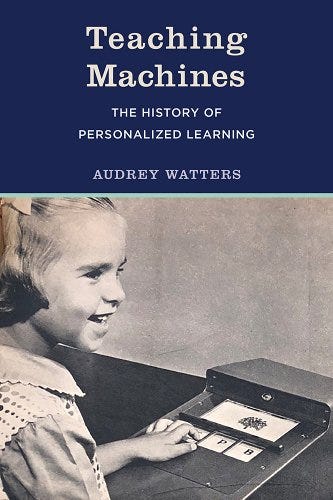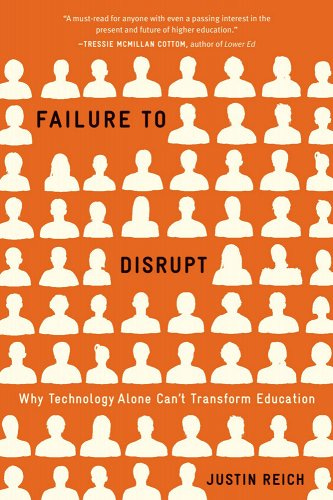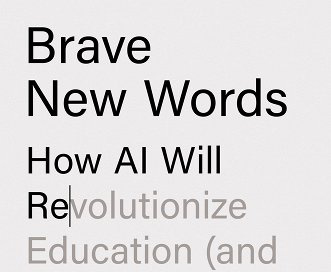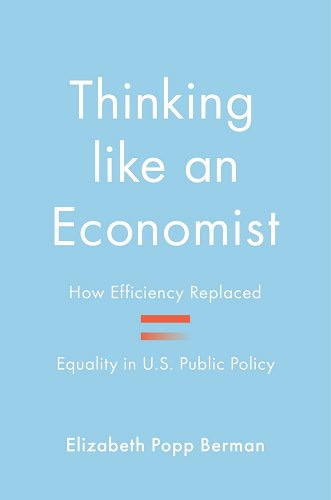What Is the Purpose of Education?
Generative AI is forcing us to grapple with this question.
I managed to get my hands on an advance copy of the forthcoming book on AI and education by Sal Khan, founder of Khan Academy and the ChatGPT-powered AI-tutor, Khanmigo.
I am perplexed by the title.
The book is explicitly positioned as a guide on how to use AI-powered technology (Khanmigo, really) to, in the words of the marketing copy, “build a more accessible education system for students around the world,” but the title clearly invokes Aldous Huxley’s classic dystopia, Brave New World, in which individuals are sorted by IQ in a genetically engineered society.
In other words, it’s the opposite of what Khan seems to see in a world where every student has access to a bespoke AI tutor.
Huxley’s title is a reference to a line from the character Miranda in Shakespeare’s The Tempest. Miranda has spent nearly her entire life exiled on an island with only her father, Prospero, and the monster servant Caliban after her father was deposed by his brother as the rightful Duke of Milan. At the very end of the play, following all kinds of weird magic stuff, Prospero and Miranda return to Naples and Miranda exclaims:
How many goodly creatures there are here!
How beauteous mankind is!
O brave new world,
That has such people in it.
Miranda is an innocent, having lived an extremely sheltered life, and as most people read it, her exclamations can be taken simultaneously sincerely and ironically. Miranda is certainly being sincere, but the audience understands that these people are far more complex characters than Miranda in her naïveté can perceive.
Huxley uses the reference purely ironically to comment on a society where everyone is controlled through a combination of genetic engineering, psychological conditioning, and drugs, where freedom and autonomy are sacrificed in the name of hierarchy and order in an authoritarian technological bureaucracy.
Choosing a title that invokes a famous technology-mediated dystopia for your book about how technology-mediated education will lead us into utopia makes no sense to me other than someone liked the world play and knew that Brave New World had something to do with technology, so it must be cool.
I’m thinking Sal Khan has neither read Brave New World nor asked ChatGPT for a summary of it.
“Personalized education,” of the kind Khan and his ilk envision, is uninterested in the questions that I believe should animate the core of education: What do you want to know? and What do you want to do with that knowledge?
I have read Brave New Words. It did not take long, but I’m not going to review it for a couple of reasons. For one, it’s not out until May and I never like reviewing books that other people can’t yet access and read for themselves. For two, my book More Than Words: How to Think About Writing in the Age of AI is, in many ways, the antithesis to Brave New Words. In fact, there’s an entire chapter discussing why I believe Khan’s technology-mediated approach to so-called “personalized education” results in something like the opposite, wholly de-personalized education, as students march across the algorithm-dictated landscape until they wind up in exactly the spot the algorithm wants them to.
If and when I write about this book it will be in the context of a “critical essay” that will only be relevant in a world where the book is available for reference and people can weigh my interpretation of the text against their own.
I am, however, going to review the way this book is being marketed and why I think it’s important for us to resist how it is being positioned in order to retain our individual and collective autonomy in the face of technological change. We must understand that what on the surface looks like a pure practicality - “Helping kids achieve!” - is actually part of a broader ideology that marginalizes individual autonomy and freedom in the name of efficiency.
I first have to note the grammatical construction of the subtitle, “How AI will revolutionize education…” This suggests that AI is a wholly independent agent, working away on its own initiative, as opposed to something within human control. This is reinforced by the marketing copy which starts (emphasis mine):
Whether we like it or not, the AI revolution is coming to education. In Brave New Words, Salman Khan, the visionary behind Khan Academy, explores how artificial intelligence and GPT technology will transform learning, offering a road map for teachers, parents, and students to navigate this exciting (and sometimes intimidating) new world.
This is the language of technological determinism, the notion that once technology is introduced into the culture, it advances according to its own imperatives. The arrival of public generative AI in the form of ChatGPT, and the hype surrounding it has been deliberately shaped by tech companies and those who believe in the “effective accelerationism” movement in a way that’s meant to subvert any criticism of the use of this technology. Effective Accelerationists (e/acc) believe that technological advancement is essentially the raison d'être of humankind and will lead to a future utopia.
“Whether we like it or not” is a particularly clever phrasing given that it acknowledges some people may have doubts about the potential benefits of this technology-mediated future. Unlike tech investor Marc Andreessen’s “Techno-Optimist Manifesto” which paints anyone who doubts the potential of technological advancement as essentially an enemy of humanity, this suggests some concern may be reasonable.
But importantly, Sal Khan wants you to know that, despite your concerns, there’s nothing you can do about it, and anyway, it’s going to be great, so why would you worry?
I don’t want to get too in the weeds on this stuff, but I think it’s useful for regular folks to acquaint themselves with the roots and aims of what has come to be known as the TESCREAL movement, an acronym coined by Dr. Emile Torres and Dr. Timnit Gebru that represents the constellation of ideologies that have developed essentially concurrently with the rapid technological shifts of the computer/internet age. TESCREAL stands for: transhumanism, Extropianism, singularitarianism, cosmism, Rationalism, Effective Altruism and longtermism, with the e/acc movement being a kind of specific flavor of longtermism.
(This is a good primer from Torres on what each of those movements entails and why they’re important in today’s contexts. I also recommend this episode of
’s “Tech Won’t Save Us” podcast in which Marx and Torres walk through the acronym to arrive at what’s most meaningful about the e/acc movement.)1I doubt that Khan would self-identify as e/acc, but his world view adopts the fundamental precept of technology as an inevitable augmentation to human life that animates the effective accelerationist ideology.
This is an ideology that is fundamentally rooted in the values of efficiency and productivity as the highest order goals for life and society. This is related to what it means to “think like an economist,” itself an ideology that has become such a fundamental underpinning of American culture that we’ve ceased to recognize it as what it is, an ideology.
Before I go further into the ideology manifested in the marketing of Brave New Words, I want to pause and make clear that Khan is also wrong about how teaching and learning works. This is a case made at length by Audrey Watters in her indispensable book Teaching Machines: The History of Personalized Learning. It is also made by Justin Reich of MIT in his book Failure to Disrupt: Why Technology Can’t Transform Education.


It’s also being made by
at his Mathworlds newsletter, including in a recent breakdown of how Khanmigo interacts with students in working math problems “Khanmigo Doesn’t Love Kids.”But it’s important to recognize that this is not just a discussion about what works in education. It also needs to be a discussion about what values animate and inform the fundamental purpose of education, what education is for.
It may be instructive to look at who has endorsed Brave New Words with pre-publication blurbs to see where it is positioned in regards to the question: What is education for? “Personalized education,” of the kind Khan and his ilk envision, is uninterested in the questions that I believe should animate the core of education: What do you want to know? and What do you want to do with that knowledge?
Among the blurbers for the book there are four billionaires: Bill Gates, Laurene Powell Jobs, Satya Nadella (CEO of Microsoft) and Sam Altman (CEO of Open AI, which gave Khan pre-release access to ChatGPT-4 in order to develop Khanmigo).
We also have Arne Duncan (former Secretary of Education). There is Walter Isaacson (Elon Musk’s biographer), Steven Levitt (of Freakonomics, the chief popularizer of “thinking like an economist”), Wendy Kopp (founder of Teach for America), and Dr. Angela Duckworth (who popularized the “grit” theory of achievement).
In Gates, Duncan, Kopp, and Duckworth, you would be hard-pressed to find a group of people who have had a more deleterious effect on education over the last 25 years. Gates, by virtue of his wealth and the way he uses the Gates Foundation to control education research and his attempt to cram the Common Core State Standards down the collective American throat, is the colossus, but don’t sleep on Duncan who both opened the door to increased privatization of public schools (which his successor Betsy DeVos sprinted through), and oversaw the disastrous Obama “Race to the Top” initiative, which torched over $4 billion dollars on a neoliberal approach to educational improvement based on data collection and standardization, rather than addressing the underlying conditions that have such outsized impact on children’s educations.
Kopp and Duckworth are relative lightweights, but Teach for America parachuted untrained teachers into unfamiliar communities under the theory that this elite cadre of twenty-two year olds would improve educational outcomes, thus distracting from the actual underlying reality that disparity in resources is by far the most important underlying factor when it comes to schools. Duckworth’s research into “grit” as the underlying key to achievement was interesting in theory, but propelled on a wave of hype, escaped her lab like Frankenstein’s monster and briefly existed as an educational fad, that even Duckworth herself said was a bad idea.
Collectively these folks represent a vision for education that is fundamentally market-based where the answer to the question, “What is education for?” is something along the lines of: To give students access to the educational experiences that allow us to rank and sort them into categories of merit.
Personally, I fundamentally reject this view of education, even as it is the dominant operating principle of our education system. I think education should be a process through which individuals become their best selves, which definitely includes finding their way to an economically productive life that provides material security, but is also much more than that.
Even if you agree with the ranking and sorting view of education and reject my view, I would like to point out that if you believe that the current status quo of schools and schooling is unacceptable and needs changing, the people who have had essential dominion for how schools work over the last thirty years are either the actual blurbers of Khan’s book, or agree with them about education. If you think education is a disaster, it’s those people who have been in charge.
How eager should we be to keep following their lead into a technology-mediated future, whether we like it or not?
Links
This week at the Chicago Tribune I get into the proper care of books, inspired after witnessing a terrible book crime on a recent flight.
At Inside Higher Ed, I urged institutions to resist giving in to generative AI FOMO and making sure they know what generative AI is and can do before leaping headlong into our AI future.
The Tournament of Books is off and running, already with some surprising results.
I normally look for links more pithy than a policy brief, but this piece about the need to make generative AI in schools a “public problem” is absolutely vital.
Do you want to write about book news and events? LitHub is looking for people, and it pays!
At Esquire, Molly Templeton rounds up what she thinks are the best sci-fi books of the year so far.
This link is from a Twitter account named Restoring Faith in Humanity, and I’ll be darned if this particular clip didn’t do the trick.
This week’s literary-themed laugher from McSweeney’s is by John-Clark Levin: “Gen Z Beowulf.”
Recommendations
1. Idlewild by James Frankie Thomas
2. Craft in the Real World: Rethinking Fiction Writing and Workshopping by Matthew Salesses
3. Molly by Blake Butler
4. Berlin by Bea Setton
5. The New York Trilogy by Paul Auster
Bea B. - Brooklyn, NY
I think Bea looks like a good candidate for the ineffable strangeness of Jesse Ball: Census is the specific pick.
1. Blood Meridian by Cormac McCarthy
2. What We Talk About When We Talk About Love by Raymond Carver
3. Prometheus Rising by Robert Anton Wilson
4. Tar Baby by Toni Morrison
5. Barbarian Days by William Finnegan
Spencer N. - Seattle, WA
For Spencer my Biblioracle senses are pointing me towards Esi Edugyan’s propulsive adventure novel, Washington Black.
1. Dissolution by CJ Sansom
2. Dark Fire by CJ Sansom
3. God, Human, Animal, Machine: Technology, Metaphor, and the Search for Meaning by Meghan O’Gieblyn
4. A Memory Called Empire, by Arkady Martine
5. Dream Machines by Steven Connor
Daniel B. - Melbourne, Australia
I think there’s a better than decent chance Daniel’s read this author, and even this book, but it’s what I have to go with…The Fifth Season by N.K. Jamison.2
I have turned in the big revision of the book and now await some edits, so there’s at least a chance that I’ll be able to get to some of the recommendation request backlog with a midweek post.
I know there’s a lot of people sympathetic to my view of what education is for who have gravitated to this space, but in my view, the key to doing better for all students on this front is about having free exchanges of differing points of view. So, what’s your answer to the question? What is the purpose of education?
That’s all for this week folks. Really enjoyed everyone sharing their favorite dog books in last week’s newsletter. I have some reading to do.
Take care,
John
The Biblioralce
We have started to hear more and more about the threat of Christian Nationalism and the associated Project 2025, which is a blueprint for remaking the Federal Government around explicitly Christian values. I wouldn’t say that e/acc is necessarily as a big a threat currently, but it is a significantly important ideology that is underppreciated.
All books (with the occasional exception) linked throughout the newsletter go to The Biblioracle Recommends bookstore at Bookshop.org. Affiliate proceeds, plus a personal matching donation of my own, go to Chicago’s Open Books and an additional reading/writing/literacy nonprofit to be determined. Affiliate income for this year is $36.60.






I enjoyed this very much. You've challenged my thinking in many ways.
However, as a former HS English teacher and now as a community college professor, I think there is a piece missing in the "AI in Education" narrative. For many of our students, writing is a chore. When I need to move a load of dirt, which I consider a chore, I use a wheelbarrow (a tool). I think our students see writing and AI in the same way. I see little discussion around the perception of writing inside the "AI in Education" narrative, and to me it is the central concern. As a society, we collectively have taught students to hate reading and writing. We're going to need to address that fact before the tool (AI) goes away. Re-centering the focus of education on "Love of Learning" and not on "Knowledge Acquisition" would go a long way.
Homeschool mama here. The purposes of my child's education are: to love learning, become who she's designed to be/meant to be/wants to be, and contribute to community in positive ways.